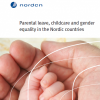Publications

As the financial, economic, political, and social crises in Europe continue unabated, UNI Europa is launching Troika Watch, an online austerity policy watchdog. Through Troika Watch, UNI Europa aims to offer an assessment of the austerity policies and their ill-effects, and to reveal workers’ individual, real-life stories in the sectors covered by UNI Global. A first report on Portugal.

Job Losses and the restructuring process in the financial sector

UNI Equal Opportunities Department launched the "Booklet on good practices in gender equality in union organizations"

As the financial, economic, political, and social crises in Europe continue unabated, UNI Europa is launching Troika Watch, an online austerity policy watchdog. Through Troika Watch, UNI Europa aims to offer an assessment of the austerity policies and their ill-effects, and to reveal workers’ individual, real-life stories in the sectors covered by UNI Global. A first report on Greece.
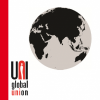
We believe that without adequate safeguards put in place, FDI in multi-brand retail will likely lead to widespread displacement and poor treatment of Indian workers in retail, logistics, agriculture and manufacturing...
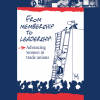
Improving gender balance in union leadership and decision-making structures remains a fundamental challenge for the trade union movement. Despite the feminisation of the labour market and of trade unions, the representation of women in senior level positions remains low in many trade union organisations. Without gender balance trade unions are at risk of having an image that is outdated and out of touch with their membership, and unrepresentative of women’s specific interests. Gender balance is crucial to the modernisation of trade unions and to fulfilling EU objectives for the
economic, social and political representation of women in decision-making.
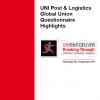
In preparation for its 3rd World Conference in September 2011, UNI Post & Logistics asked its affiliate unions to complete a survey of issues affecting postal operators, postal workers and their unions. The survey focused on social conditions, gender equality, the effects of competition in the postal market and union administration in what is proving a transformative moment for postal workers the world over. Fifty-eight UNI member unions from forty-eight countries submitted surveys. The following results should help give UNI P&L unions some insight into the conditions postal workers face in countries other than their own. Perhaps not surprisingly, the data clearly show divergent pay and conditions between North and South, developed and developing countries. Yet the data are perhaps most helpful in showing how the differences in countries in various stages of liberalization.
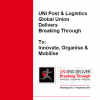
Background Document from 3rd UNI P&L Global Union World Conference, Washington, USA, 7-9 September 2011

It is a voluntary agreement between a global company, such as Deutsche Post DHL (DP DHL) and a global union, like UNI Global Union or the International Transport Workers’ Federation (ITF), on behalf of its members. The agreement covers labour aspects and workers’ rights.
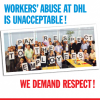
UNI Global Union and ITF are campaigning to ensure that Deutsche Post DHL world wide acknowledges its social responsibility as an international employer. Working with Deutsche Post DHL workers and their unions throughout the world, we are demanding that the company deploy a consistent worldwide social policy that recognizes and respects labour rights.

A compilation of Case Studies on the Liberalisation of the Postal Sector

Research on the health and safety situation of the film industry in India

A handbook on the health and safety issues Indian unions in the film sector are facing

The UNI Call Centre Charter is a set of broad principles designed for the call centre industry. The aim is to set a reasonable standard for this important and fast growing industry.

As part of the European Social Dialogue, the social partners — UNI Europa and the European Telecommunication Network Operators’ Association (ETNO) — have made an agreement on guidelines for the operation of customer contact centres in the telecom sector.

These Guidelines are intended to provide guidance to UNI Europa affiliates, and to coordinators and members of EWCs and SNBs.
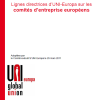
These Guidelines are intended to provide guidance to UNI Europa affiliates, and to coordinators and members of EWCs and SNBs.
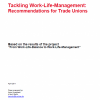
Based on the results of the project "From Work-Life-Balance to Work-Life-Management

A view on how Europeans manage to cope with work and private life

Budapest 2010: UNI europa P&MS Conference report

Expectations predict that the ICT sector will need to rely more and more on a wider pool of workers. Employers are already complaining about shortages of experts – but at the same time they are ignoring the existing potential of workers outside their traditional horizon.

The fact that the ICT Forum took place near the Danish capital was no coincidence. In December 2009, representatives from 193 nations came together in Copenhagen for the UN World Climate Summit with the intention of negotiating a follow-on agreement to the Kyoto Protocol limiting GHG emissions.

According to one influential report, climate change "must be regarded as market failure on the greatest scale the world has seen"

Informe sobre el Taller de Lanzamiento del Proyecto « Decisiones para la Vida »
«Que venha essa nova mulher de dentro de mim», Praia Grande, Brasil, octubre 4-6, 2009

One of the main aspects for attaining decent work is the establishment of egalitarian
societies, where men and women have the same opportunities for accessing
productive resources, works, social services and education.
We hope this manual is a useful tool in the defence of the labour rights struggle for
the those we represent. This is its objective. This is our goal.

Предложение UNI Финансы по реформированию финансовой системы

A UNI code for Professionals and Managers

Leaflet to introduce the UNI Europa Youth team and contact details

Trends in employment, workforce, industrial relations and the social partners within the ICT sector

Grafiska - Sweden publication on the Graphical sector

The research is based on case studies from 13 countries around the world. We have been looking into the driving forces of liberalisation as well as the liberalisation process itself and what its effects were in terms of competition but most importantly on workers themselves. In another part of this study we have also looked into how unions have dealt with this issue.

The Employee Free Choice Act and the Opportunities Ahead

Industrial relations and social dialogue in the Web 2.0 world

Эта брошюра, которую можно прочитать всего за 30 минут, даст вам представление о том, почему фонды частных прямых инвестиций представляют собой огромную опасность для рабочих мест, условий занятости и труда по всему миру, и о том, почему профсоюзы, в том числе UNI, борются за то, чтобы этот сектор экономики, в котором обращаются многие миллиарды долларов, был поставлен под надлежащий контроль.

Winning trade union rights in the MENA region was identified as a key issue in a recent meeting of global unions - including UNI global union - in Amman.
“We still have a long way to go to win union rights across this region,” said UNI Development’s Raul Requena.

UNI global union and security giant G4S - the second largest private employer in the world that operates in more than 110 countries - have signed a global agreement. The aim is to improve employment standards across the global security industry and ensure that employee and union
rights are respected throughout the company.

UNI global union and security giant G4S - the second largest private employer in the world that operates in more than 110 countries - have signed a global agreement. The aim is to improve employment standards across the global security industry and ensure that employee and union
rights are respected throughout the company.

We are in the midst of the world’s worst financial crisis since the crash of the 1920’s. We have out of control financial markets with systems of supervision and regulation which are not up to the task.

Call centre professionals are being urged to speak up to secure their jobs in
this year’s UNI Action Month in call centres that runs through October.
The aim is to spotlight the high level of insecurity faced by workers in the
industry and the need for union organisation.

Offshoring in general and nearshoring to Eastern Europe in particular have received a growing attention in the media throughout the continent since the accession of the New Member States (NMS1) in 2004 and 2007.

N/A

The Principle of Responsibility: Ethical Management in Offshoring Processes

UNI global union and ISS - one of the world’s leading providers of facility
services - have signed a breakthrough global agreement that opens the door
to union organising in all operations. The agreement ensures that workers
have the right and opportunity to organise, with union access to employees
and assurances the employer will not oppose unionisation.

Global networking and building union membership in Temporary Work Agencies are two
key objectives to emerge from UNI’s first global conference on the industry.The aim is to
improve conditions for temporary agency workers and build a dialogue with the agencies
to establish agreements that set global standards.

Diversity is wealth – but it is awealth that often remains untapped. This is especially true when
looking at employment patterns in the ICT sector, an area that is seen worldwide as a job-creation
machine and the symbolisation of modernity.

This report is about a particular type of offshoring in the IT sector, where
companies take advantage of the benefits of moving work offshore and yet where
the work (or some of it) is actually done in the home ‘onshore’ country.

During 2006, UNI Global Union undertook to bring private equity “out of the shadows”. As a result of our work together with Global Union colleagues, private equity has become front page news. Governments around the world have woken up to the impact of private equity on their national economies.

Graphical unions and employers in Latin America are pressing governments to use the tendering process to enforce labour rights. This follows a historic joint commitment by UNI Graphical and the Latin American Graphical Industry Confederation. Governments are urged to ensure that companies tendering for public contracts in paper processing, ...

UNI Finance Survey on the UN Global Compact - Companies' Commitments on Freedom of Association and on the Right to Collective Bargaining

Geneva, Switzerland, 23-25 May 2006 - Summary Report

UNI-Europa Post and Logistics is taking the fight to ‘Save our Post’ to the Council of Ministers following a disappointing vote by the Strasbourg Parliament. As hundreds of postal workers demonstrated in the rain outside, MEPs voted through by 512 votes to 156 a delaying amendment that will mean total liberalisation in 2011-2013.

Even companies operating in other sectors are increasingly interested in offering business
services. Some of the major players include IT and telcos such as Dell and Siemens, British
Telecom and Fujitsu – the boundaries that used to separate different sectors are becoming
blurred.

This final report is submitted by Rambøll Management to Union Network International
and reports our own study on investments and employment in the telecommunications sector.
The overall objective of the study is to analyse the relationship between regulation and investment and to analyse the challenges for the employment in the telecommunications sector.

After a long campaign UNI has signed a global agreement with the world’s number two printer
Quebecor that respects and promotes labour rights. The Barcelona signing ensures these rights
will apply in Quebecor operations and subsidiaries and in suppliers. “This could not have been achieved without the support and solidarity of union members in Quebecor plants around the world,” ...

Affiliate ATGWU in Uganda has won recognition from Group 4 Securicor - target of a global UNI
Property Services campaign. With help from UNI and the SEIU, the union signed the agreement on
March 27 after a two-year struggle. “We hope we can penetrate other multinationals in the private
security industry in Africa,” said ATGWU’s David Balirraine.

Although the term is not in everyday use, “business services” have gained considerable prominence in the global economy. In such diverse endeavours as the reform of federal authorities, the implementation of software projects or the restructuring of major corporations,...

Since UNI Online was launched four years ago we have equipped and trained many unions around the world.Twenty five computers went out earlier this year to unions and liaison councils across Africa with another 25 ready to go. A similar number is ready to go to unions in Eastern Europe and Central Asia.

Unions from three continents agreed in Leipzig, Germany to work more closely together in
organising employees at the global logistics giant DHL’s super hubs in Leipzig, Wilmington,
Ohio and Hong Kong. 40 participants heard a powerful call to DHL’s parent company
Deutsche Post World Net to sign a global agreement to ensure union rights in the 220
countries where it operates.

Building trade union organisation and widening collective bargaining are key
aims of UNI’s involvement in China as multinationals make their presence felt in
one of the world’s biggest and fastest growing economies.

A key aim of UNI-Europa Finance is increased employee involvement in the decision-making mechanisms of multinational companies. It is important that developments at the company level continue to be linked to the more general trade union goals for which UNI Finance is working.Workers’ representatives within companies must not become disassociated from the rest of the trade union structures.

Banks in Australia and New Zealand reduced branch and staff numbers significantly during the
1990s and downgraded the role and status of bank branch managers. While financial
deregulation, technological change, and increased competition contributed to this trend, the
banks also misjudged the willingness of customers to accept a banking business model in
which direct personal relationships...

This report is in two parts. Part 1 reviews global ‘futures’ reports for the sector which carry some
strong messages about the industry’s global imperatives. They describe client needs for onestop
flexible service packages across the whole range of financial services.

The future of trade unions depends on growth -
reaching out to new members and creating new
agendas.
The role of a global union like UNI is to help
national unions grow in the multinational companies
- and help spread best recruitment and
organising practices from country to country.

Telefónica was the very first global framework agreement signed by UNI, way back in 2000. Now there are more than 12 agreements involving UNI and about 50 with all the global unions.

The young but fast growing customer service and call centre industry is already changing in the
face of a new, global mobility revolution. Jobs already stripped out of corporate operations and
brought together – often in areas of industrial decline - are now on the move again.

To have a decent job is a basic need of people in all countries. The ILO’s decent work agenda encompasses four strategic objectives: employment promotion, rights at work, social protection, and social dialogue. The decent work agenda is based on the realisation that those objectives are best pursued together, as progress towards each of them reinforces and complements action towards the others.

UNI, together with its affiliates, and with the support of partners in international trade union solidarity and development cooperation, is actively involved in fighting the HIV/AIDS pandemic around the globe.

India’s IT and services industries are growing. Numerous qualified Indians are finding
work in an area that lives mainly from the export of services to developed industrial
nations, and displays a strong dynamic. There are hardly any regulations for
employment and working conditions; they are mainly subject to market forces.





